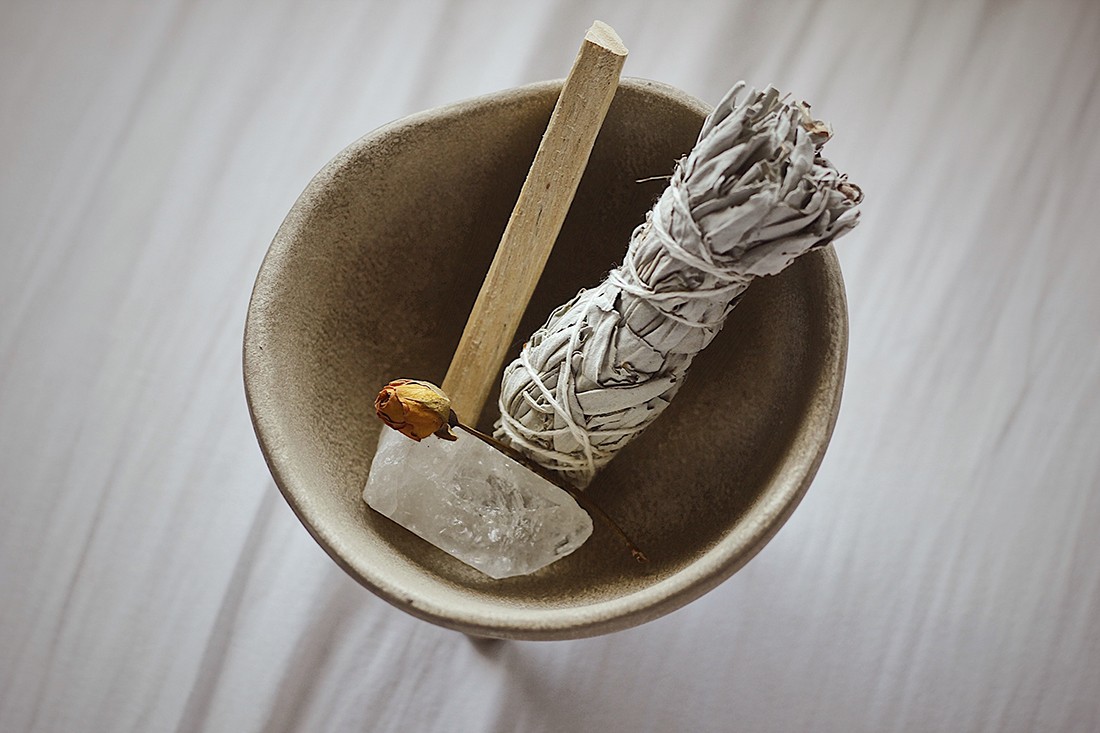
resetting your home’s energy
We are leaving resolutions in 2020. No more setting goals to be forgotten by mid-February; instead, we are focusing on awareness — and allowing that awareness to guide us throughout another year. In 2021, mindfulness is key.
As we embark on a new year, the obvious place to start a journey of mindfulness is where we spent most of 2020: our own homes. We asked Lauren Wilson, Holistic Health Practitioner and Spiritual Coach, what methods and tools — both physical and mental — we can use to assure our homes are the sanctuaries they’re meant to be.
on gratitude in the home
Creating a feeling of luxurious energy in the home is just as attainable as creating a luxurious aesthetic in the home. When something feels “off,” it is important to trust your instincts.
“You should always feel welcome in your home,” says Lauren. “Many people call me to cap off their spring cleaning to reset their space and clear out any old emotional debris. Like dust, energy collects and coats over everything.
Our homes are really an extension of our bodies — a place to feel safe and whole, creative and connected. Mindfully resetting the energy of your home begins with thanking your home for its protection through the challenges of 2020, being grateful for having your home and feeling compassion for those who no longer have safe space. Into 2021, we bring our gratitude forward and focus on the frequency of abundance, peace and the momentum of brand-new opportunities.”
on defining clear boundaries
The economical and societal shifts of 2020 are still being felt in the new year, and the same can be said for the new relationships we have with our homes.
“Working from home can create an involuntary blindness to our surroundings,” says Lauren. “It gets harder to define that living space from our work environment because it’s become so enmeshed. Make sure your workspace has boundaries from your living space.”
Since a separate workspace, such as an office or sunroom, is not always possible, it’s important to note that boundaries are not necessarily maintained by walls. “Energetic boundaries work too,” says Lauren. “If we set limitations for the spread of our workspaces, we can begin to redefine those spaces we need to be a sanctuary.
If you can, keep intimate areas like the bedrooms as sanctuary space. Don’t work there, don’t watch TV and don’t travel there with your laptop. Try to keep it neutral so it always remains a place to be calm and relaxed — your reset zone.”
Although socializing in 2021 has yet to be determined, Lauren suggests treating your “public spaces” as though someone can pop in at any moment. “When you take the time to see your home through the eyes of a visitor, it means that you actively engage with your surroundings and exercise your ownership,” says Lauren. “Decluttering is key. If we find ourselves surrounded with ‘things,’ it’s tougher to see our way to balance our personal space.
on what to keep in stock
Living in a community can pose a challenge to our sense of personal space. We can see, hear and smell what’s happening around us at all times — and when we find ourselves at home more, it’s harder to define the boundaries of our physical and mental spaces. “While you might not escape what your neighbor is cooking for dinner,” says Lauren, “you can make sure you don’t allow the energy of their day to drift into your space.”
Lauren suggests maintaining the energy of your individual spaces through tools such as fragrant oils, a diffuser, salt lamps and a radio or a Bluetooth speaker to play background music and create flow. Keeping items such as smudge sticks and Epsom salts throughout your home to periodically cleanse your space is also recommended, provided the homeowner understands each item’s use and how they impact them as an individual.
More important than these physical items are the mindfulness tools you can keep with you at all times. “Cleansing the energy of a home begins with intention,” says Lauren. “When we are overwhelmed by outside influences, energies and demands, it can be difficult to navigate and focus on that intention.” Lauren recommends tactics such as visualization, meditation and breathwork to help sustain your intentions for your home. These are practices that anyone can begin with a little research and, well, practice.
on making space for ourselves
Coping with the constant barrage of fear and the 24-hour news cycle was not an easy task in 2020. “Self-care rituals such as massages, meditation, yoga, sports activities or just hanging out with friends were compromised in 2020,” says Lauren. “Losing those things really underscores how important they are to how we thrive, not just survive.”
“When we see our home as an extension of us and not just a place to put our stuff, we can begin to take a deeper ownership of the energy in it.”
Lauren notes that, although we are adaptable, we must be careful to not get trapped in routines that ignore our core needs. “Having a plan for engaging our personal space can be a great way to prepare for changes outside of our control,” says Lauren. “If your home is a sanctuary, it can be a constant, a reliable place that remains entirely within your control.
You can change the aesthetic with paint and furnishings that you may not have tried before. Create a sense of play and whimsy. Bring in elements of nature, such as plants and water. If you have a balcony or a patio, create an escape or respite that you can hang out in; or better still, a place to invite friends back into your home.
When we see our home as an extension of us and not just a place to put our stuff, we can begin to take a deeper ownership of the energy in it. We are creators, and with proper focus and intention we can create the energetic home of our dreams.”
Contact Lauren Wilson directly by email or by phone at 303 550 6692.
SUBSCRIBE
to stay in the know
Your monthly dose of significant properties, seductive architecture, influential design, art that matters and community happenings.

